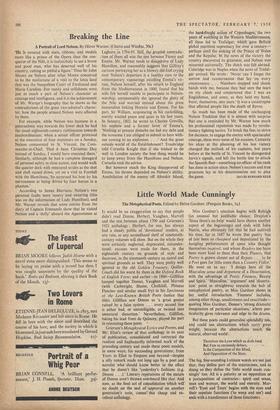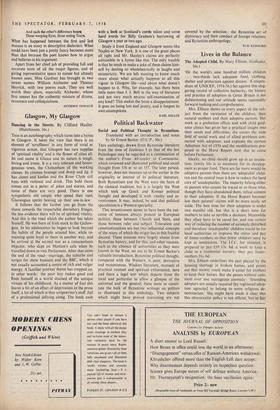Little World Made Cunningly
The Metaphysical Poets. Edited by Helen Gardner. (Penguin Books, 5s.) IT would be an exaggeration to say that people didn't read Donne, Herbert, Vaughan, Marvell and the rest ,between about 1700 and Grierson's 1921 anthology : Herbert, for one, has always had a steady public of 'devotional' readers, at any rate, as any secondhand shelf of nineteenth- century volumes will show. But on the whole they were certainly neglected, deprecated, misunder- stood; excuses were made for them, in the eighteenth century on grounds of style and decorum, in the nineteenth century on moral and spiritual grounds as well. They were pretty well ignored in the old Golden Treasury; Quiller- Couch did his worst by them in the Oxford Book of English Verse; and earlier—in 1860—Gilfillan lumped together Donne, Vaughan and Marvell (with Cartwright, Hume, Chalkhill, Phineas Fletcher and similar small fry) in his Specimens of the Less-Known British Poets (notice that title). Gilfillan saw Donne as 'a great genius ruined by a false system . . . every second line is either bad, or unintelligible, or twisted into unnatural distortion.' Nevertheless, Gilfillan, taking his lead from de Quincey, played his part in reinstating these poets.
Grierson's Metaphysical Lyrics and Poems, and Mr. Eliot's review of that anthology in its year of publication, consolidated and corrected the random and haphazardly informed work of the preceding century and made these poets models, in some ways, for succeeding generations; from Yeats to Eliot to Empson and beyond—despite a silly remark made not long ago by a poet and novelist who should know better to the effect that he doesn't like 'yesterday's fashions (e.g. Donne , . .).' Literary reputations of the stature of Donne aren't thrown overboard like that. And now, as the final act of consolidation Which will no doubt set the seal of 'approval on another generation's taste, comes" this cheap and ex- cellent anthology. Miss Gardner's selection begins with Raleigh (an unusual but justifiable choice; Drayton's `Since there's no help' would have shown another aspect of the beginnings) and ,ends with John Norris, who obviously felt that he had outlived his time, for in 1687 he wrote that poetry 'has of late been so cheapned and depretiated by the bungling performances of some who thought themselves inspired, and whose Readers too have been more kind to them than their Planets, that Poetry is grown almost out of Repute . . . to be a Poet goes for little more than a Country Fidler.' He went on to say : 'I design here all the Masculine sense and Argument of a Dissertation, with the advantage of Poetic Fineness, Beauty and Spirit.' Masculine,"argument' and 'disserta- tion' point us straightway towards the hub of metaphysical poetry, as Miss Gardner shows in her useful introduction. `Fineness' includes, among other things, sensitiveness and exactitude— quoting Miss Gardner, Donne's 'strong dramatic imagination of particular situations,' where par- ticularity gives relevance and edge to the drama.
But these poets could generalise splendidly too, and could use, abstractions which carry great weight, because the abstractions touch' the natural, observed world : Therefore the Love which us doth bind But Fate so enviously debars, Is the Conjunction of the Mind, And Opposition of the Stars.
The big, fine-sounding Latinate words are not just that; they define part of the macrocosm, and in doing so they define the 'little world made cun- ningly' too. All is a polarity or an opposition or a juxtaposition of contraries : spirit and sense, man and woman, the world and eternity. Mar- vell's `EyeS and Tears' begins with the eyes and their separate functions (`to weep and see') and ends with a transference of those functions
And each the other's difference beam These weeping Eyes, those seeing Tears. What has happened between the first and last stanzas is an essay in descriptive dialectics. What could have been just a pretty fancy becomes more than that because the poet knows how to argue and believes in his argument.
Apart from her chief job of providing full and accurate texts of all the major figures, and of giving representative space to minor but already known ones, Miss Gardner has brought in two newer names, William Alabaster and Thomas Heyrick, with two poems each. They are well worth their place, especially Alabaster, whose first sonnet has the authentic mixture of drama, reverence and colloquialness.
ANTHONY THWA ITE



































 Previous page
Previous page